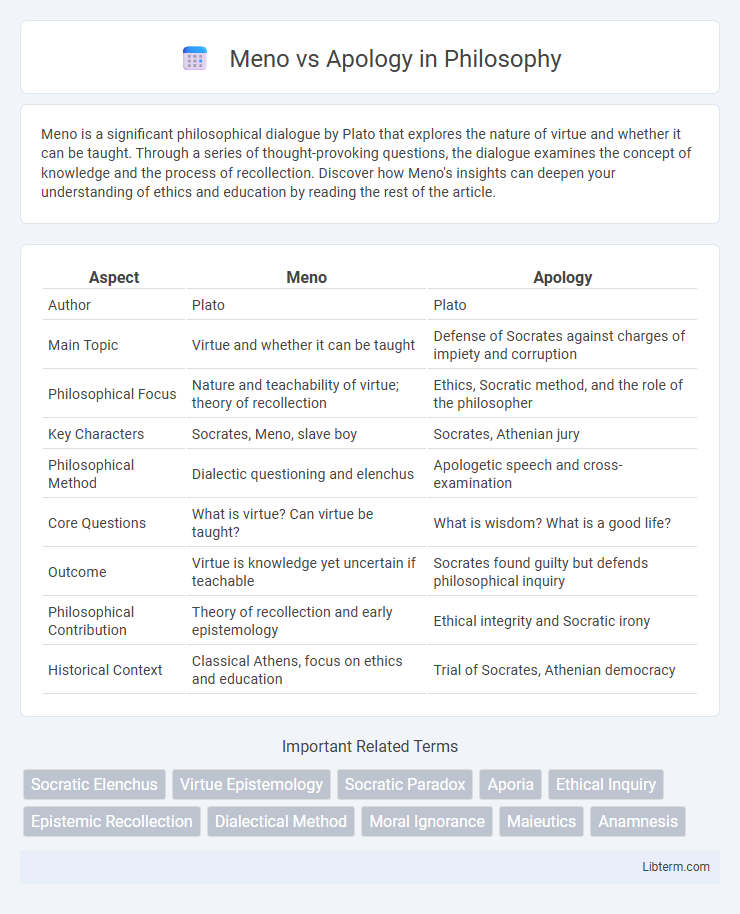Meno is a significant philosophical dialogue by Plato that explores the nature of virtue and whether it can be taught. Through a series of thought-provoking questions, the dialogue examines the concept of knowledge and the process of recollection. Discover how Meno's insights can deepen your understanding of ethics and education by reading the rest of the article.
Table of Comparison
| Aspect | Meno | Apology |
|---|---|---|
| Author | Plato | Plato |
| Main Topic | Virtue and whether it can be taught | Defense of Socrates against charges of impiety and corruption |
| Philosophical Focus | Nature and teachability of virtue; theory of recollection | Ethics, Socratic method, and the role of the philosopher |
| Key Characters | Socrates, Meno, slave boy | Socrates, Athenian jury |
| Philosophical Method | Dialectic questioning and elenchus | Apologetic speech and cross-examination |
| Core Questions | What is virtue? Can virtue be taught? | What is wisdom? What is a good life? |
| Outcome | Virtue is knowledge yet uncertain if teachable | Socrates found guilty but defends philosophical inquiry |
| Philosophical Contribution | Theory of recollection and early epistemology | Ethical integrity and Socratic irony |
| Historical Context | Classical Athens, focus on ethics and education | Trial of Socrates, Athenian democracy |
Introduction: Comparing Meno and Apology
Meno and Apology, two of Plato's dialogues, explore distinct philosophical themes through Socratic inquiry. Meno examines the nature of virtue and whether it can be taught, while Apology presents Socrates' defense against accusations of corrupting the youth. Both texts employ dialectic methods to reveal underlying truths about knowledge, ethics, and the human condition.
Historical Context of Plato's Dialogues
Plato's dialogues Meno and Apology emerge from the turbulent sociopolitical landscape of 5th-century BCE Athens, reflecting its intellectual and moral debates. Meno explores the nature of virtue amid Socratic questioning during a period marked by Athenian confidence yet internal strife following the Peloponnesian War. Apology presents Socrates' defense during his trial in 399 BCE, exemplifying Athenian tensions around democracy, authority, and philosophical inquiry in a city grappling with crisis and change.
Main Themes in Meno
Meno explores the nature of virtue and whether it can be taught, emphasizing the theory of recollection as a way to acquire knowledge. The dialogue interrogates the distinction between true belief and knowledge, highlighting the importance of defining concepts precisely for philosophical inquiry. Socratic questioning in Meno reveals the challenges of attaining knowledge through inquiry and the role of innate ideas in learning.
Key Arguments in Apology
Socrates defends his philosophy by asserting that he is guided by a divine inner voice, the daimonion, which prevents him from wrongdoing and encourages ethical inquiry. He challenges the accusations of corrupting the youth and impiety by questioning his accusers and emphasizing his commitment to seeking truth and wisdom. Socrates argues that death is not to be feared, portraying it either as a peaceful non-existence or a transition to an afterlife where he can continue philosophical discussions.
Socratic Method in Meno and Apology
The Socratic Method in Plato's Meno emphasizes eliciting innate knowledge through dialectical questioning, revealing the concept of anamnesis or recollection, while in Apology it serves as a tool for critical self-examination and defense against accusers. In Meno, Socrates systematically deconstructs assumptions to guide a slave boy toward geometric truths, illustrating knowledge as latent within the soul. Contrastingly, Apology uses the method to expose ignorance and challenge sophistry during Socrates' trial, reflecting its role in ethical inquiry and civic accountability.
The Nature of Virtue: Insights from Meno
Plato's *Meno* explores the nature of virtue through Socratic questioning, proposing that virtue is a form of knowledge or true opinion linked to the soul's ability to do good. This dialogue contrasts with *Apology*, where virtue is depicted as an intrinsic quality nurtured by philosophical inquiry and ethical living. Insights from *Meno* emphasize virtue's teachability and its relationship to intellectual understanding, shaping key philosophical debates on moral education.
Socrates’ Defense and Philosophy in Apology
Socrates' defense in Apology centers on his commitment to philosophy as a pursuit of truth and moral integrity, rejecting accusations of corrupting youth or impiety. He argues that his role as a philosophical gadfly, questioning societal norms and encouraging critical thinking, serves the polis by promoting virtue and wisdom. This defense contrasts with Meno's focus on the nature of virtue, highlighting Socrates' prioritization of ethical inquiry and Socratic method over theoretical debates.
Epistemology: Knowledge and Learning in Both Dialogues
In Plato's "Meno," epistemology centers on the theory of recollection, suggesting that learning is an act of remembering innate knowledge, while Socrates demonstrates this through the slave boy's geometric proofs. Conversely, "Apology" emphasizes Socratic ignorance and the pursuit of wisdom, where Socrates claims knowledge of his own ignorance as a foundation for genuine inquiry. Both dialogues explore the nature of knowledge, contrasting innate understanding with the recognition of one's limitations as essential steps toward true learning.
Influence on Western Philosophy
Meno and Apology, both dialogues by Plato, have significantly shaped Western philosophy through their exploration of epistemology and ethics. Meno introduces the theory of recollection, advancing ideas about innate knowledge and the learning process, which influenced later epistemological debates. Apology presents Socrates' defense of his philosophical mission, emphasizing the importance of moral integrity, critical inquiry, and the examined life, foundational concepts in Western ethical thought.
Conclusion: Philosophical Significance of Meno and Apology
Meno explores the nature of knowledge and virtue through the theory of recollection, emphasizing self-examination and intellectual inquiry as paths to understanding. Apology centers on Socratic wisdom and moral integrity, highlighting the importance of questioning and ethical living despite societal opposition. Together, they underscore the philosophical pursuit of truth and the transformative power of dialectical reasoning in examining human virtue and knowledge.
Meno Infographic

 libterm.com
libterm.com